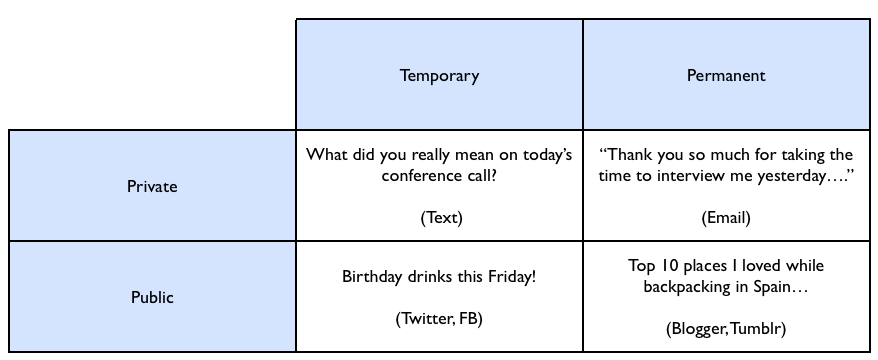
Dear readers,
Today, I’m happy to congratulate my good friend Steve Chung and his team on raising $6M from SK Planet for their new ephemeral mobile messaging app, Frankly, which you can download here. I’m an advisor to the company, and have been honored to work with them closely over the last year as they’ve iterated and polished their ideas. More coverage on WSJ, Pando, and Inside Mobile Apps.
Those who have been following the space know that there’s an all-out explosion of messaging apps, particularly in Asia, and the Frankly team is bringing a unique new product to market. Steve has written an essay below outlining the foundations of the company, and why bringing an ephemeral approach to a more traditional texting UI makes so much sense.
Finally, I wanted to note that it’s a funny reminder how the densely connected networks of Silicon Valley work. I first met Steve when I was moving down to the Bay Area six years ago, and I was looking for a room to rent near Sand Hill Road. I was working in the area as an Entrepreneur-in-Residence and it turned out the Craigslist post I replied to was a house full of Stanford GSB students (including Steve) that had an extra room available in their house. At $1200/month, it was the right price, and I took it sight unseen. Now years later, after he took a stint out in South Korea, it’s great to be working with him again.
Anyway, enjoy the essay and congrats again to Steve and his team!
Regards,
Andrew
San Francisco, CA
Steve Chung, CEO of Frankly:
“The Power of Forgetting”
"Through millennia, forgetting has remained just a bit easier and cheaper than remembering…not anymore"
- Professor Viktor Mayer-Schonberger (Oxford University)
Professor Mayer-Schonberger makes the above point in his critically acclaimed book Delete: The Virtue of Forgetting in the Digital Age. He points out that throughout most of human history, forgetting something was the default and remembering was the exception. However, with recent advances in technology, global access and the resulting drop in storage costs, for the first time in human memory (pun intended!), we have reached an age where forgetting something was more difficult than remembering.
In everyday speak, it means that when we post something on the web or exchange a message with someone, what you say will effectively live forever. From this perspective, "remembering" is easy – ones and zeroes saved on a server somewhere for pennies. Forgetting and deleting this digitally from the Internet – cumbersome, costly and very hard. This realization undergirds the foundation of Frankly and it's why we're excited to announce our app launch today (www.chatfrankly.com/download).
All around us, we hear about someone losing a job or not getting an interview because of what they posted on Facebook during college (or the weekend before). We live in a world that records everything we do. As we see this unfold before our eyes, it's actually quite scary. We basically become actors of the Truman Show of Humanity (and searchable by keyword!) and our lives converge to the lowest common denominator: one big Facebook page of self-curated, artificial, self-censored versions of ourselves. The scarier thing is that this is actually happening quicker than we realize, before we all fully appreciate its consequences as prices of storage keep halving and our entire collective dialogue is forever archived.
Is this good or bad? Well, like most things, it depends. My proposal to this is that we should be deliberate and conscientious about how we use our technologies, especially when it comes to human communication – arguably, the very centerpiece of our humanity (okay, a bit overdramatic!). In reflecting on the virtues of remembering and forgetting, I also think it's important to acknowledge that there are both private and public communications – each with its need for permanent and temporary formats. Here's a framework that I've used to help me organize my thoughts on the issue, inspired by the Future of Privacy Forum's latest blog post on a related subject:
Four Quadrants of Digital Communication

(Disclaimer: I don't think every form of digital communication has to fall under the above framework – this is just one of many interpretations)
The box I am most interested in (and why Frankly exists) is the top left – private and temporary communication. In my humble opinion, it is the most important box as it impacts my everyday life and 97% of all US young adults text with their mobile phones (Pew Research). With more than 6 billion mobile subscriptions worldwide and the spread of mobile phone growth cited by the World Bank as "unmatched in the history of technology" – texting is arguably the most influential communication tool in the world.
There are a few unique aspects of texting that stand out among other forms of communication. Texting is about being:
- timely (time sensitive)
- urgent (important)
- informal (casual / short style)
In fact, its technical name of "SMS" (for Short Message Service) was by definition aimed to be short and limited to 160 characters. Moreover, we as users of text messaging had no choice but to accept the accidental digital consequence of record leaving as a by-product of the original GSM standards agreed to in 1985 (thanks Wikipedia!). This was a time when the discretions of permanence and temporary were not topics of major concern – and to do so would've been too great of a technical and operational challenge and probably not worth the effort then.
So, if a medium is primarily intended as a short, time-bound and urgent form of communication, a strong case should be made that text messages should default to "forgetting" and not to "remembering" for posterity. Because of unintended legacy, we just accepted, without deliberate intent, that SMS should just be permanent records that we keep. It wasn't until recently with the rise of the so-called MIM (mobile instant messengers) that 'texting' jumped the proverbial curve and roared into our lives as IP-based tools (out of the hands of mobile operators), permitting 3rd party developers like us to create a more powerful, flexible and engaging platform for users worldwide. We now have the technology to make a deliberate choice in how we use the variety of communication tools we have (the four quadrants above), and I believe it is time that we also deliberately choose forgetting and remembering, depending on which of the four quadrants we wish to communicate.
This is the foundation for why Frankly was built. We believe that the larger category of texting should default to being temporary messages, with record keeping as an exception. We believe that doing this will make texting (and its modern counterpart, mobile messaging) even more valuable as a category – opening up conversation between people, freeing up users to speak their minds, to be more honest, to be more spontaneous, to be more off-the-cuff and to be more frank in a world where everything else is being recorded and thus risk being over-edited and superficial. We believe this will lift the burden of permanence from the shoulders of the users and open up necessary and critical conversations all over the world in ways we haven't thought possible. As our conversations move more to the digital format, so should our view toward what's kept and deleted by default.
As a corollary, many people out there don't get Snapchat and why the teens are loving it. They relegate the service to a mere "sexting" app and miss the greater point. It is not coincidence that the 13 – 17 year old demographic (the "Snapchat crowd") sends more than 3000 texts per month (Nielsen), and sends as many messages as the next three age groups combined. This group is the expert on text messaging, and the fact that Snapchat's "temporary" default mode with photos disappearing is a massive hit? Well, I think this group knows what it's doing and truly understands what texting was always meant to be – short, temporary, timely and urgent (for them!).
So, perhaps the question isn't "why do messages and photos disappear on Frankly?" I think the real question may be "why don't messages and photos disappear once they are read as default," and "why isn't that the standard in all texting and mobile messaging applications?" As with Snapchat, the primary basis that Frankly messages and photos disappear as default is not about heightened security and evading some elusive government organization (which is what most application in our emerging category tout). Frankly is designed for normal people, for their daily conversations, not for spies or criminals (I'd be happy to introduce you to other apps that are designed to do that). To suggest such is to focus too narrowly on a particular feature and miss the greater, more fundamental use case for the everyday user. In fact, in the latest Pew Research report entitled "Anonymity, Privacy, and Security Online," Americans are apparently 4 times more interested in evading "certain friends" and "people in the past" than the "government!" Enough said!
Don't agree with what I've said? Well, I hope you will use Frankly to tell me what you really think, and we won’t have to relive that moment forever in digital history just in case I am right! Ultimately, Frankly is here to tilt the balance a little more toward forgetting as the default for our users – just as history of mankind has shown us and just as mobile messaging, I argue, was always meant to be. We want to give our users a solid ground to stand on amidst the overwhelming tsunami of digital permanence and record hoarding. We hope you'll give us a try, and whatever happens, we hope you will have your own place in our digital world to speak frankly!
Follow Frankly on Tumblr or Twitter (@chatfrankly).
No comments:
Post a Comment